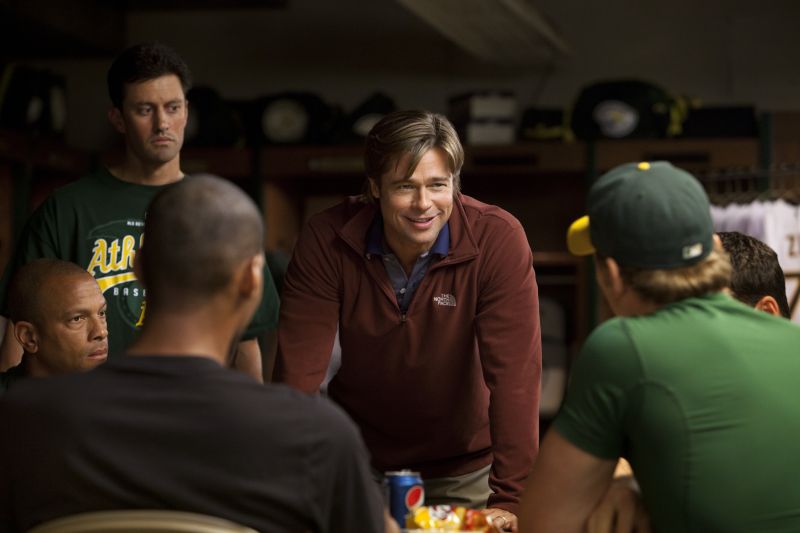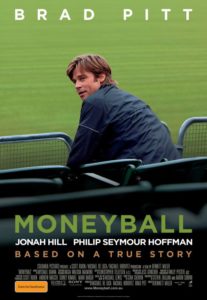[stextbox id=”grey” caption=”Moneyball (2011)” float=”true” align=”right” width=”200″]
Director: Bennett Miller
Runtime: 95 minutes
Starring: Brad Pitt, Jonah Hill, Kerrin Dorsey, Robin Wright, Philip Seymour Hoffman
Distributor: Sony
Country: US
Rating: Highly Recommended (?)
[/stextbox]
It’s no secret that money makes the world go around, and there is no better example of this than on the sporting field. The US Super Bowl costs an estimated $2.6 million to place an 30 second commercial, a price that escalates on on annual basis. In Australia, we are not immune to the lure of the almighty dollar, as the NRL’s Melbourne Storm salary cap scandal demonstrated over the last few years. In Michael Lewis’ 2003 book Moneyball: The Art of Winning an Unfair Game, Lewis examines the effect that over-spending in baseball’s major leagues has on the competitive value of the game, particularly when comparing the top paid $125 million organisation of the New York Yankees to the “bottom three” $41 million operation of the Oakland Athletics.
Billy Beane (Brad Pitt, The Tree of Life), the general manager of the Oakland Athletics, is frustrated with the team’s finances after a loss in the league championships. With three of their major players bought or traded to bigger organisations, Beane tries to convince the archaic board that they need to change their old-school thinking in order to survive as a team. After constant knock-backs from other teams who don’t have the players Beane wants at the prices they are able to pay, Beane encounters Peter Brand (Jonah Hill, The Sitter), an analyst with radical ideas about assessing players’ worth through metrics. Annoying the traditionalists, including team manager Art Howe (Philip Seymour Hoffman, Jack Goes Boating), Beane is determined to prove Brand’s theories right and take his rag-tag team to the championship game.
It may sound like any other sports movie, but Moneyball is anything but traditional. With Aaron Sorkin’s name attached to the writing duties, along Steven Zaillian (The Girl With the Dragon Tattoo, American Gangster) as his co-writer, there’s a certain expectation that this will be a thinking-person’s sports film. Much like The Social Network eschewed the actual technical aspects of Facebook for the human (melo)drama, here director Bennett Miller’s film is all about the relationships off the field. Indeed, until we are close to the climax, very little grass is seen for the duration of the film, and even then it is only fleeting. Beane’s quest to change the nature of the game is as much about facing his own personal demons, and it is to be expected that the relationship with his daughter becomes one of the key elements to his ultimate redemption.
One of the main challenges in Moneyball, a drama set against maths and baseball, is in making it sexy. The obvious thing to do is cast Brad Pitt, who doesn’t so much chew the scenery as literally consume it, as Pitt has rapidly become the king of acting while eating. It is a rare moment when Pitt doesn’t at least have a snack in hand, but this is just one of the many weapons in his arsenal. Pitt treads the line of being a slick Jerry Maguire-esque figure, but downplays his own importance, allowing the talented group of actors around him, including Robin Wright and the young Kerrin Dorsey, who has been impressing on TV’s Brothers & Sisters and even provides a little song to the soundtrack (by way of Australia’s Lenka). Jonah Hill similarly plays against his “funnyman” type, holding his own against Pitt, but also providing some of the best one-liners in the picture. The only miscalculation is Philip Seymour Hoffman, who is criminally underused as the team manager, and is underwritten to the point of insignificance, much like the character he portrays.
[stextbox id=”custom”]Moneyball hits a home-run as a drama, but is also a fascinating look into the world of money and baseball, and the origins of a practice that would change the face of the game.[/stextbox]
Moneyball is released in Australia on 10 November 2011 from Sony.





